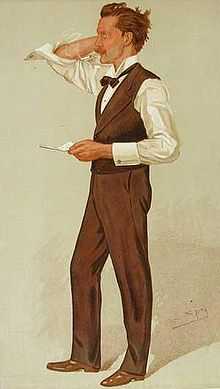Henry Cust
| Henry Cust | |
|---|---|
 Henry Cockayne-Cust | |
| Born |
Henry John Cockayne Cust 10 October 1861 London, England |
| Died |
2 March 1917 (aged 55) London, England |
| Education | Trinity College, Cambridge |
| Occupation | Politician and editor |
| Spouse(s) | Emmmeline Mary Elizabeth (Nina) Welby-Gregory (1893-1917) |
| Children | Lady Diana Manners (illegitimate daughter) |
| Relatives | Adelbert Brownlow-Cust, 3rd Earl Brownlow (cousin) |
- For his father, see Henry Cockayne-Cust.
Henry John "Harry" Cockayne-Cust (10 October 1861 – 2 March 1917) was an English politician and editor who served as a Member of Parliament (MP) for the Unionist Party.
Biography
Cust was born to Sara Jane Cookson and Henry Cockayne-Cust,[1] and was educated at Eton (where he was captain of the Oppidans) and Trinity College, Cambridge.[2] While at Trinity College, he was elected to the Apostles and graduated with second-class honours in the Classical Tripos. Initially pursuing a legal career, Cust was admitted to the Inner Temple in 1888 but was not called. Instead he decided to enter Parliament, and won a by-election in 1890 for Stamford, Lincolnshire. He left Parliament at the general election of 1895, but returned five years later when he won a seat in the constituency of Bermondsey, remaining until 1906.
Cust was one of The Souls and was attached to Pamela Wyndham, who later married Edward Tennant. Others in the same clique were Margot Asquith, Arthur Balfour, George Nathaniel Curzon, Alfred Lyttelton, Godfrey Webb, and George Wyndham. Considered a brilliant conversationalist by his contemporaries, he had a reputation as a womaniser and was the natural father of the socialite and philanthropist Lady Diana Cooper, by the Duchess of Rutland, although this was not acknowledged until much later. Cust was also rumoured to be the father of Beatrice Stephenson, who became the mother of British prime minister Margaret Thatcher, and although there was no solid proof of this connection, Lady Diana Cooper often jokingly referred to Mrs. Thatcher as her niece.[3]
In 1892, Cust met William Waldorf Astor, who invited him to edit the Pall Mall Gazette. Despite lacking any background in journalism, Cust immediately accepted. He soon transformed the newspaper into the best evening journal of the period, thanks in part to his securing such contributors as Rudyard Kipling and H. G. Wells. Yet Cust rejected contributions submitted by Astor himself, who had literary aspirations; and this, coupled with political disagreements, led to Cust's dismissal in February 1896.[4]
After leaving the Pall Mall Gazette, Cust continued his career as an author. He wrote several poems, most notably "Non nobis domine".[5] During World War I Cust was active in propaganda on behalf of the British Government. In August 1914, he founded the Central Committee for National Patriotic Organizations.[6] He died in 1917 of a heart attack at his home in Hyde Park Gate, London. He was heir to the barony of Brownlow, a position which at his death fell to his brother, Adelbert Salusbury Cust (b. 1867).[6]
Marriage
As the result of a purported pregnancy, he married in 1893 Emmeline Mary Elizabeth Welby-Gregory (1867–1955), known as Nina, who was the daughter of Victoria, Lady Welby. The pregnancy was either false or a misrepresentation, and the couple, whose marriage was thereafter contentious, did not have any children. Nina Cust was a translator and editor of her mother's papers. She and her husband are buried together in Belton, Lincolnshire, with a monument designed by her.
Illegitimate descendants
In 2009, it came to light that Cust was the great-grandfather of writer Allegra Huston, biological daughter of British peer John Julius Norwich and stepdaughter of American film-maker John Huston, via her grandmother, Lady Diana Cooper, Cust's daughter via a covert liaison.
Anita Leslie, in her book Marlborough House Set, implies that Cust had many more children with aristocratic lovers than just Diana Cooper. She writes (pg. 248):
- so much of the Cust strain entered England's peerage, and that from such a number of cradles there gazed babies with eyes like large sapphires instead of the black boot buttons of their legal fathers.
Legacy
- An annual Cust Lecture “on some important current topic relating to the British Empire” was endowed in Nottingham University to commemorate his work.[6]
- His Occasional Poems appeared in 1918, printed in Jerusalem.[6]
Footnotes
- ↑ Ancestry of Harry Cust
- ↑ "Cust (Cockayne-Cust), Henry John Cockayne (CST881HJ)". A Cambridge Alumni Database. University of Cambridge.
- ↑ John Campbell The Grocer's Daughter
- ↑ Damian Atkinson, "Cust, Henry John Cockayne", in The Oxford Dictionary of National Biography, H.C.G. Matthew and Brian Harrison, eds. (Oxford: Oxford University Press, 2004), v. 14, p. 819.
- ↑ http://www.bartleby.com/101/876.html
- ↑ 6.0 6.1 6.2 6.3
 Chisholm, Hugh, ed. (1922). "Cust, Henry John Cockayne". Encyclopædia Britannica (12th ed.). London & New York.
Chisholm, Hugh, ed. (1922). "Cust, Henry John Cockayne". Encyclopædia Britannica (12th ed.). London & New York.
Further reading
- Anita Leslie, The Marlborough House Set, Doubleday, New York, 1973 - Contains an entire chapter on Cust (Chapter 23, pp. 241–248)
External links
- Works by Henry John Cockayne Cust at Project Gutenberg
- Works by or about Henry Cust at Internet Archive
- Hansard 1803–2005: contributions in Parliament by Henry Cust
| Parliament of the United Kingdom | ||
|---|---|---|
| Preceded by John Compton Lawrance |
Member of Parliament for Stamford 1890 – 1895 |
Succeeded by William Younger |
| Preceded by Alfred Lafone |
Member of Parliament for Bermondsey 1900 – 1906 |
Succeeded by George Joseph Cooper |
| Media offices | ||
| Preceded by Edward Tyas Cook |
Editor of The Pall Mall Gazette 1892 - 1896 |
Succeeded by Douglas Straight |
|